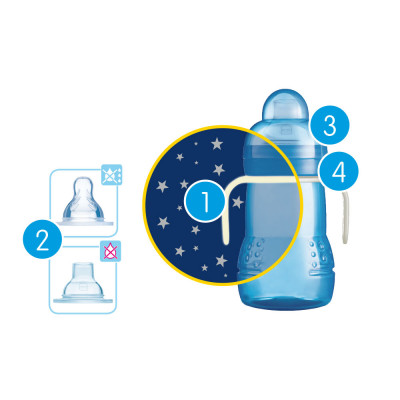Trainer+ Night
- El asa luminosa hace que el Trainer+ Night sea fácil de encontrar en la oscuridad
- Con tetina antiderrames y boquilla extrasuave con superficie de silicona SkinSoft para facilitar la transición del pecho o del biberón al Trainer+ o vaso
- Forma ergonómica – fácil para que el bebé lo agarre
- Boquilla ancha para facilitar su llenado y limpieza

1. ASA LUMINOSA
- Hace que Trainer+ sea fácil de encontrar en la oscuridad
- Antideslizante - proporciona un buen agarre para las manos del bebé
2. TETINA ANTIDERRAMES Y BOQUILLA EXTRASUAVE
- 2 pasos para beber independientemente:
1 PASO 1 Tetina antiderrames: La tetina antiderrames con superficie de silicona SkinSoft que facilita la transición del pecho al biberón o Trainer+ y apoya al bebé en sus primeros intentos de beber solito.
2 PASO 2 Boquilla antiderrames extrasuave: Con la boquilla antiderrames extrasuave, los bebés hacen la transición del pecho o biberón al Trainer + o vaso con facilidad.
3. TAPA PROTECTORA
- Protege de la suciedad
- También funciona como taza medidora gracias a la escala integrada
4. BOQUILLA ANCHA
- Fácil de llenar y limpiar
°Libres de BPA y BPS: Todos los biberones MAM están fabricados con materiales libres de BPS y BPA (libre de BPA de acuerdo con el Reglamento [UE] n.º 321/2011)
Todos los productos MAM están fabricados con materiales libres de BPA y BPS.
MAM SkinSoft™: aceptada fácilmente por los bebés, pues la reconocen como algo familiar
Extra-soft spout – ideal for baby’s first cup
A prueba de derrames - para una primera alimentación independiente
La función de brillo en la oscuridad hace que sea fácil encontrar este producto cuando está oscuro
Para bebés de 4 meses
INNOVACIÓN DESARROLLADA CONJUNTAMENTE CON MÉDICOS
GALARDONADA CON EL PREMIO A LA SEGURIDAD DE PRODUCTO DE LA UE 2019
Four-month-old babies love drinking from a cup. The MAM Cup range provides them with the ideal support here. This will ensure that baby makes the perfect transition from breastfeeding or bottle feeding to independent drinking.
Bisphenol A (BPA) is an important component for the manufacturing of polycarbonate (PC), whereas Bisphenol S (BPS) is an organic chemical used to make polysulfone. Among other items, food packaging, plastic utensils and baby bottles are just a few examples of products made with PC, whereas the main usage of BPS is in thermal papers and inks. The problem: Trace amounts of chemical substances gradually leach out of the plastic into the food and might eventually get into the body. This can affect small children and infants in particular.
As a result of exposure to BPA, experts and studies have seen disruptions to the hormone system and brain, diabetes and heart damage as well as an increased risk of cancer. Although scientific evidence is not yet conclusive, the European Commission - based on the precautionary principle - has banned the usage of BPA in baby bottles in order to protect the health and safety of babies and small children.